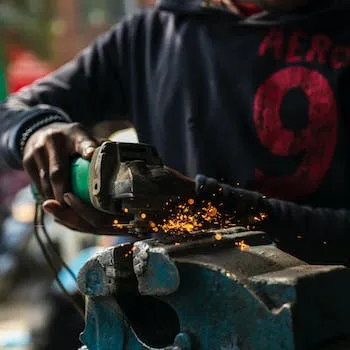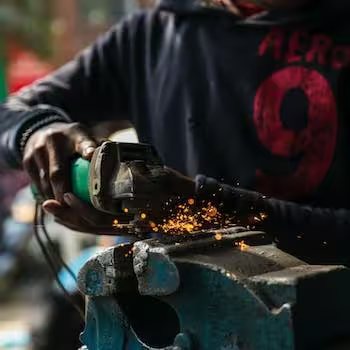-
Contents
“Unlock the Future of Installation, Maintenance, and Repair with AI!”
The use of artificial intelligence (AI) in installation, Maintenance, and Repair Occupations is becoming increasingly important as technology advances. AI can help automate processes, reduce costs, and improve safety. As the demand for these services grows, it is likely that AI will become an integral part of the installation, Maintenance, and repair industry. In this article, we will explore the potential for AI to be used in these occupations in the future and discuss how it could benefit both businesses and workers. We will also look at some of the challenges that may arise from the increased use of AI in these fields.
Exploring the Impact of AI on Other Installation, Maintenance, and Repair Occupations

The impact of artificial intelligence (AI) on installation, Maintenance, and Repair Occupations is a rapidly evolving topic. As AI technology continues to advance, it is becoming increasingly integrated into the workplace, and this has implications for many different types of occupations. This article will explore the potential impacts of AI on installation, Maintenance, and Repair Occupations.
First, it is important to understand the scope of installation, Maintenance, and Repair Occupations. These occupations involve a wide range of activities, from installing new equipment to troubleshooting existing systems. They also involve a variety of skills, such as electrical work, plumbing, carpentry, and welding. As AI technology advances, it is likely to have an impact on these occupations in several ways.
One potential impact of AI on installation, Maintenance, and Repair Occupations is increased automation. AI-enabled robots and other automated systems can be used to perform many of the tasks that are currently done by humans. This could lead to fewer jobs for human workers in these fields as machines become more capable of performing the same tasks. Additionally, AI-enabled robots may be able to do certain tasks more quickly and accurately than humans can. This could lead to increased efficiency in these occupations.
Another potential impact of AI on installation, Maintenance, and Repair Occupations is increased accuracy. AI-enabled systems can be programmed with detailed instructions that allow them to complete tasks with greater precision than humans can achieve. This could lead to fewer mistakes being made in these occupations and improved safety for workers. Additionally, AI-enabled systems may be able to detect problems before they become serious issues, allowing for quicker repairs and less downtime for businesses.
Finally, AI may also have an impact on the skills required for installation, Maintenance, and Repair Occupations. As machines become more capable of performing certain tasks autonomously, workers may need to develop new skills in order to stay competitive in the job market. For example, workers may need to learn how to program or operate AI-enabled systems in order to remain relevant in their field.
In conclusion, the impact of AI on installation, Maintenance, and Repair Occupations is likely to be significant as technology continues to advance. Automation could lead to fewer jobs for human workers in these fields while increased accuracy could lead to improved safety and efficiency. Additionally, workers may need to develop new skills in order to stay competitive in the job market as machines become more capable of performing certain tasks autonomously.
How Will AI Change the Way Other Installation, Maintenance, and Repair Occupations Operate?
Artificial Intelligence (AI) is revolutionizing the way installation, Maintenance, and Repair Occupations operate. AI-driven automation is making it possible for these occupations to become more efficient and cost-effective. AI can be used to automate mundane tasks, such as scheduling Maintenance and repairs, as well as more complex tasks, such as diagnosing problems and providing recommendations for repairs. AI can also be used to monitor equipment performance in real-time, allowing for proactive Maintenance and repairs.
AI-driven automation is also making it possible for installation, Maintenance, and Repair Occupations to become more accurate and precise. AI can be used to detect patterns in data that would otherwise be difficult or impossible for humans to detect. This allows technicians to identify potential problems before they become major issues. AI can also be used to provide detailed instructions on how to perform a task correctly, reducing the risk of human error.
Finally, AI is making it possible for installation, Maintenance, and Repair Occupations to become more efficient. AI can be used to automate routine tasks, freeing up technicians’ time so they can focus on more complex tasks. AI can also be used to optimize processes by analyzing data and providing recommendations on how to improve efficiency.
In summary, AI is transforming the way installation, Maintenance, and Repair Occupations operate by making them more efficient, accurate, and cost-effective. By automating mundane tasks and optimizing processes, AI is helping these occupations become more productive and successful.
What Skills Will Other Installation, Maintenance, and Repair Occupations Need to Use AI in the Future?
In the future, installation, Maintenance, and Repair Occupations will need to use AI in order to stay competitive and efficient. AI can help automate mundane tasks, reduce errors, and improve accuracy. Some of the skills that these occupations will Need to Use AI in the future? include:
1. Data Analysis: Installation, Maintenance, and Repair Occupations will need to be able to analyze data from sensors and other sources in order to identify patterns and trends. This will help them make better decisions about how to maintain and repair equipment.
2. Machine Learning: Occupations will need to understand how machine learning algorithms work in order to use them effectively. They will also need to be able to interpret the results of these algorithms in order to make informed decisions.
3. Automation: Occupations will need to be able to use automation tools such as robotic process automation (RPA) in order to automate mundane tasks such as scheduling Maintenance or ordering parts. This will help them save time and money while improving accuracy.
4. Troubleshooting: Occupations will need to be able to troubleshoot problems with AI-enabled systems in order to identify the root cause of issues and take corrective action. This will help them reduce downtime and improve customer satisfaction.
5. Security: Occupations will need to understand how AI-enabled systems can be secured against malicious actors in order to protect customer data and ensure system integrity. This will help them protect their customers’ privacy and prevent costly data breaches.
Q&A
Q1: Will Other Installation, Maintenance, and Repair Occupations Need to Use AI in the future??
A1: Yes, AI is becoming increasingly important in many industries, including installation, Maintenance, and repair. As technology advances, AI will become more prevalent in these occupations and will be used to automate tasks and improve efficiency.
Q2: What types of tasks could AI be used for in installation, Maintenance, and Repair Occupations?
A2: AI can be used for a variety of tasks in installation, Maintenance, and Repair Occupations. For example, AI can be used to diagnose problems with equipment or systems, detect potential issues before they occur, optimize Maintenance schedules, and provide predictive analytics.
Q3: How can AI help installation, Maintenance, and repair workers?
A3: AI can help installation, Maintenance, and repair workers by automating tedious tasks and providing them with more accurate data to make decisions. Additionally, AI can help reduce costs associated with repairs by providing more accurate diagnoses of problems and helping to prevent future issues.In conclusion, AI is likely to become increasingly important in installation, Maintenance, and Repair Occupations in the future. As technology advances, AI will be able to take on more complex tasks and provide more accurate results. This will allow for faster and more efficient repairs and installations, as well as improved safety and accuracy. As such, it is likely that AI will become an integral part of these occupations in the near future.
If you’re an installation, maintenance, or repair worker, now is the time to start learning about AI and how it can help you in your job. AI is quickly becoming a necessity in many industries, and it’s important to stay ahead of the curve. Click here to learn more about how AI can help you in your career.


